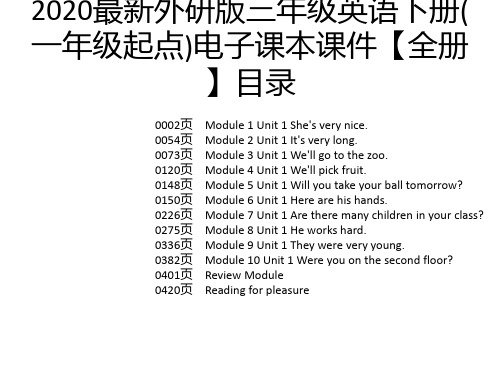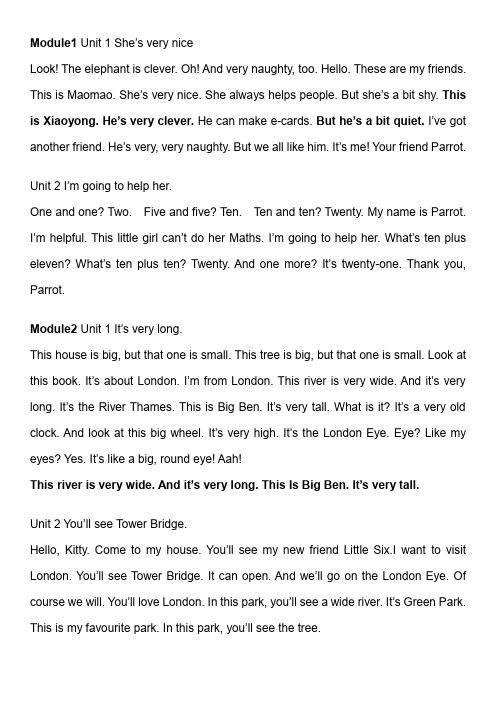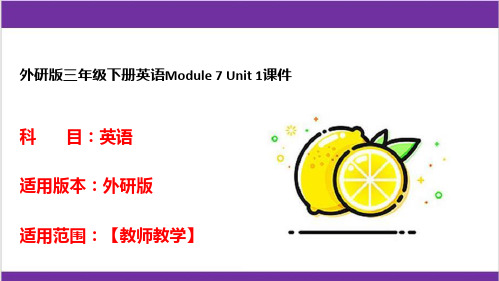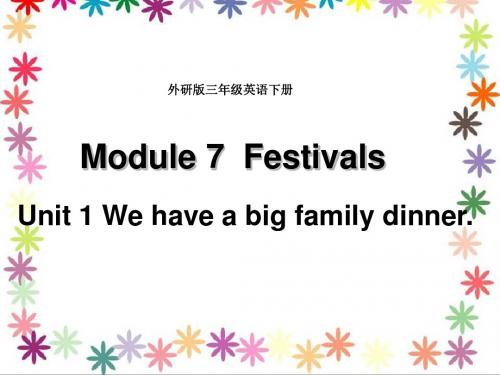英语三年级下外研版(一起)Module7 Unit1 They were very young课件1
外研版小学英语三年级第二册Module7Unit1教材内容全解

外研版小学英语三年级第二册Module7Unit1教材内容全解Module7Unit1教材内容全解Module7 Unit1 We fly kites in spring.我们在春天放风筝。
1.Listen and chant.听一听,并说唱。
【课文全译】I like summer, 我喜欢夏天,It’s my favourite season. 它是我最喜欢的季节。
I go swimming 我去游泳in this nice season. 在这个迷人的(美好的)季节里。
【课文注解】①summer(名词)夏天,短语:in summer在夏天,in spring在春天,in autumn在秋天,in winter在冬天,例句:It’s very hot in summer.夏天天气很热。
②favourite(形容词)最喜欢的,例句:——What’s your favourite colour?你最喜欢的颜色是什么?——My favourite colour is red.我最喜欢的颜色是红色。
③season(名词)季节,巧记:sea(大海)+son(儿子)=season(季节),例句:There are four seasons in a year.一年有四个季节。
——Which season do you like best?你最喜欢哪个季节?——I like summer best.我最喜欢夏天。
④nice(形容词)迷人的,令人愉快的,例句:Do you have a nice time?你们过得开心吗?【注意】nice(形容词)友好的,亲切的,讨人喜欢的,例如:Ms Smart is a nice teacher.斯玛特女士是位好老师。
The old man is nice.这位老人很亲切。
⑤I go swimming in this nice season.我在这个美好的季节里去游泳/在这个美好的季节里我去游泳。
2020最新外研版三年级英语下册(一年级起点)电子课本课件【全册】

Module 2 Unit 1 It's very long.
2020最新外研版三年级英语下册( 一年级起点)电子课本课件【全册
】
Module 2 Unit 2 You'll see Tower Bridge.
2020最新外研版三年级英语下册( 一年级起点)电子课本课件【全册
】目录
0002页 0054页 0073页 0120页 0148页 0150页 0226页 0275页 0336页 0382页 0401页 0420页
Module 1 Unit 1 She's very nice. Module 2 Unit 1 It's very long. Module 3 Unit 1 We'll go to the zoo. Module 4 Unit 1 We'll pick fruit. Module 5 Unit 1 Will you take your ball tomorrow? Module 6 Unit 1 Here are his hands. Module 7 Unit 1 Are there many children in your class? Module 8 Unit 1 He works hard. Module 9 Unit 1 They were very young. Module 10 Unit 1 Were you on the second floor? Review Module Readule 1 Unit 1 She's very nice.
2020最新外研版三年级英语下册( 一年级起点)电子课本课件【全册
】
Module 1 Unit 2 I'm going to help her.
外研版英语电子课文三年级下

Module1 Unit 1 She’s very niceLook! The elephant is clever. Oh! And very naughty, too. Hello. These are my friends. This is Maomao. She’s very nice. She always helps people. But she’s a bit shy. This is Xiaoyong. He’s very clever. He can make e-cards. But he’s a bit quiet. I’ve got another friend. He’s very, very naughty. But we all like him. It’s me! Your friend Parrot. Unit 2 I’m going to help her.One and one? Two. Five and five? Ten. Ten and ten? Twenty. My name is Parrot. I’m helpful. This little girl can’t do her Maths. I’m going to help her. What’s ten plus eleven? What’s ten plus ten? Twenty. And one more? It’s twenty-one. Thank you, Parrot.Module2 Unit 1 It’s very long.This house is big, but that one is small. This tree is big, but that one is small. Look at this book. It’s about London. I’m from London. This river is very wide. And it’s very long. It’s the River Thames. This is Big Ben. It’s very tall. What is it? It’s a very old clock. And look at this big wheel. It’s very high. It’s the London Eye. Eye? Like my eyes? Yes. It’s like a big, round eye! Aah!This river is very wide. And it’s very long. This Is Big Ben. It’s very tall.Unit 2 You’ll see Tower Bridge.Hello, Kitty. Come to my house. You’ll see my new friend Little Six.I want to visit London. You’ll see Tower Bridge. It can open. And we’ll go on the London Eye. Of course we will. You’ll love London. In this park, you’ll see a wide river. It’s Green Park. This is my favourite park. In this park, you’ll see the tree.Module3 Unit 1 We’ll go to the zoo.What will you do? I’ll go to the zoo. What will you do? I’ll go to school. What will you do this weekend, Amy? We’ll go to the zoo. What will you see? We’ll see lions, tigers and pandas.Will Sam go, too? Yes, he will. Will you go, too, Daming? No, I won’t. I’ll visit my grandpa in the countryside. He’s a farmer. I won’t see lions there. But I will see lots of pigs. We’ll see lions, tigers and pandas. Will Sam go, too? Yes, he will. Will you go, too, Daming? No, I won’t.Unit 2 Will we have breakfast at 7?Bob, come and have breakfast. I’m coming. Oh, no! It’s my breakfast. Mum, will we have breakfast at 7? No, we’ll have breakfast at 8. Will we have lunch at 12? No, we’ll have lunch at 1. Will we have dinner at 6? Yes, we’ll have dinner at 6. And we’ll have a tea party at 4.Will you visit your grandpa this weekend? Yes, I will. Will you ride your bike this weekend? No, I won’t.Module4 Unit 1 We’ll pick fruit.We’re fourteen. You’re four. We’re big. You’re small. This weekend, we’re going to a fruit farm. We’ll pick fruit. Great! Thanks, Mum. We’ll pick apples. But I don’t like apples.I do. What other fruit will we pick? Will we pick pears? Yes, we will. I’ll pick ten apples. I’ll pick fourteen. I’ll pick twelve pears. I’ll pick sixteen. I’ll pick eighteen. Let’s go now, Amy and Sam. Hooray! Will we pick pears? Yes, we will. I’ll pick ten apples. I’ll pick twelve pears.Unit 2 Thirteen, fourteen, fifteen…Hello, Kitty! I’ve got twelve apples. Ha ha, now, you’ve got thirteen apples.Look at the peaches on these trees! Let’s count them! OK! One… thirteen, fourteen, fifteen, sixteen, Seventeen, eighteen, nineteen, twenty, twenty-one twenty-two… I’m afraid we can’t see all the peaches. No, we can’t. I feel tired now. Let’s go home! All right. Let’s go! How many pens? We’ll go to the fruit farm.Module5 Unit 1 Will you take your ball tomorrow?Are you going to Hong Kong this Saturday? No, I’m not. I’m going to Hong Kong this Sunday.No. you can’t. On Saturday, we’re going to have a picnic! Yes! That’s a good idea. Will you take your kite to the picnic tomorrow? No, I won’t. Oh. Will you take your ball tomorrow? No, I won’t. Why not? Tomorrow is Friday. We’re going on Saturday! Will you take your kite to the picnic tomorrow? No, I won’t. Will you take your ball tomorrow? No, I won’t.Unit 2 On Monday, I’ll go swimming.Sunday, Monday, Tuesday, Wednesday, Thursday, Friday. And we will have Saturday. We are on holiday next week. What will you do, Shanshan? On Monday, I’ll go swimming. On Tuesday, I’ll play with my friends. On Wednesday, I’ll go to the park. On Thursday, I’ll do my homework. On Friday, I’ll visit my grandma. On Saturday, I’ll help my mother. On Sunday, I’ll read my books.Module6 Unit 1 Here are his hands.One hand, two hands, clap, clap, clap. One foot, two feet, stamp, stamp, stamp. Hello,children, Today we are going to draw a picture on the computer. What shall we draw? Let’s draw a monster! Good idea. Let’s draw a monster on the computer. Now watch… Here is this head. And here is his body. Here are his arms. Six arms! Six arms! Here are his hands. Ten hands! Ten hands! Here are his leg and his foot. One leg! One foot! All right. Let’s have a look. The monster has got one head, ten hands, six arms, one leg, one foot and one body. Here are his arms. Here are his hands. Here is his leg. Here is his foot.Unit 2 There is a small monster.There is a nose on your face. There are two eyes on your face. There is a mouth on your face. They are all on your face. This is our poster. There is a small monster. And there are two big monsters. There are twenty-four hands. There are fifteen arms. There are six legs and six feet.Module7 Unit 1 Are there many children in your class?Are there any monkeys here? No, there aren’t. Amy, can I ask you a question? Of course you can. Are there many children in your class? Yes, there are forty-one. How many boys? There are twenty boys. So there are twenty-one girls. Yes. You are right. Are there many children in a class in the UK? No, there aren’t. There are about twenty. So we’re got more friends in China! Are there many children in your class? Yes, there are forty-one. Are there many children in a class in the UK? No, there aren’t. There are about twenty.Unit 2 How many apples are there in the box?How many monkeys are there? One, two, three… twenty-three, twenty-four, twenty-five, twenty-six. There are twenty-six. How many apples are there in the box? There are twenty-six. How many pears are there in the box? There are thirteen. No, there are thirty.Module8 Unit 1 He works hard.Kitty is lazy. I’m not lazy. No, you’re not lazy. You’re very lazy. It’s Parents’ Day today. We’re going to speak to your teacher. Great! Is Daming naughty in class? No, he isn’t. He works hard. He isn’t lazy. That’s good. And he’s a clever boy, too. His work is good. I’m happy with that. Thank you, Ms Smart. Daming, Ms Smart is very happy with you work. Oh, good! Is Daming naughty in class? No, he isn’t. His work is good. I’M happy with that. Thank you.Unit 2 She’s quite good at English.I like English. I like Maths. I like PE and Chinese. I like Science. I like Art. I will work really hard. We’re got Lingling’s report. What does it say? She’s very good at Maths. She’s quite good at English. She tries hard at Science. She runs fast in PE. She’s very good at Chinese. But she doesn’t work hard at Art.Module 9 Unit 1 They were very young.Oh look! It's beautiful! And it was also beautiful then. Who are they, Lingling? They are my grandparents. They were very young then! Yes. But they are very old now. Is that you, Lingling? Yes, it's me. How old were you? I was two. Your hair was very short then. Yes, now it's long. Aah. You were very cute! And I was naughty, too.Ha ha... They were very young then! Yes. But they are very old now. Your hair was very short then. Yes, now it's long.Unit 2 He was in Hong KongHello, Dad. I'm in London now. And I was in Beijing yesterday. Dear Lucy, In the holidays, Mum and Amy weren't in Beijing. They were in London with my grandparents. Dad wasn't in London. He was in Hong Kong. And me? I was in Beijing. I was with Daming at his home yesterday. It was fun! Love, Sam.Module 10 Unit 1 Were you on the second floor?Hello. Were you in Beijing yesterday? No, I wasn't. I was in London yesterday. I was in London, too. Were you? Hi! I'm worried. I can't find Daming! We were on the first floor. Was Daming there? No, he wasn't. Were you on the second floor? Yes, we were. And Daming was there! I remember! Thank you. I'll go to the second floor now. Daming, come here! I was very worried. Sorry, Mum. This CD is for you! Happy Mother's Day! Oh, thank you. Was Daming there? No, he wasn't. Were you on the second floor? Yes, we were. And Daming was there!Unit 2 It was there.Where's my fish? It was here yesterday. Where are the vegetables? I don't know. They were here last Sunday. Where is the fruit? It was there. And where is the milk? It was there, too. Oh! Where are they now? Let's go and find them!。
外研社小学英语三年级下册(三起)Module7-Unit-1-We-fly-kites-in-spring教案

所教教科书书名外研社小学英语(三年级起点)所教年级三年级所教单元三下第七模块第一单元设计主题Module 7 Unit 1 We fly kites in spring.执教者蔡秋萍1.教学背景分析教学内容分析:本课是外研版《新标准英语》三年级起点第二册第七模块第一单元。
主要通过学习春夏秋冬四个季节这一话题,依次呈现词汇: spring, summer, autumn, winter, warm, hot, cool, cold, fly,skating 及主要语言: It’s spring. It is warm in spring. We fly kites in spring. 用这类句型谈论各个季节的特征以及在每个季节可以进行的活动。
在教学设计中,我利用身边的实物实景为学生创设真实的语言环境,让学生在快乐轻松的气氛中学习新词汇和语言点,并运用到实际生活当中,培养学生的口语表达能力。
而要完成本课的学习任务,还需要借助原有的知识点,如:go swimming, play football等有关短语。
学生情况分析:小学三年级的学生在经过了上个学期的英语学习后,有了一定的英语基础,能进行一些简单的表达。
并且他们活泼好动,竞争意识和表现欲都比较强烈,对英语学习保持着浓厚的兴趣,他们非常熟悉各个教学环节的活动,对游戏、竞赛,chant 等各种形式的活动都有着强烈的兴趣。
但是但由于他们年龄较小,容易出现注意力不集中的现象,并且其注意力往往只能保持较短时间。
因此,对他们进行的听说训练效果较好,认读能力略差。
综合以上情况,我选择运用多媒体课件作为基本的教学手段,同时设计形式多样的教学活动,充分调动学生的积极性,的把学生当成课堂的主人翁,让他们在快乐地完成各项活动的同时掌握本课的重点知识,真正做到在玩中学,让学生感受到学英语的乐趣,从而更加喜欢英语。
2.教学目标分析(一)知识目标:1.能听说认读spring, summer, autumn, winter四季单词,以及warm, hot, cool, cold 描述季节特征的词.2.掌握句型:It’s warm in spring. We fly kites in spring,并能初步运用这类语句描述季节特征及不同季节里人们从事的活动.(二)技能目标:能够运用所学的单词和句型描述四季的天气特征以及在不同季节可以进行的各种活动。
新外研版三年级下册英语 Moudle 7 Unit 1 教学课件

我最喜欢的季节是秋天。
第十页,共二十九页。
单词卡
cool /kuːl/ (形容词) 凉爽的
形近词: cook 厨师
拓展: cool作形容词时,还可以表 示“酷的;极好的”。
例句:It's cool in autumn.
在秋天,(天气)凉爽。
第十一页,共二十九页。
单词卡
winter /'wɪntə(r)/ (名词) 冬天 短语: in winter 在冬天 巧记: win(赢)+ter=winter(冬天)
例句: I like winter est.我最喜欢冬天。
第十二页,共二十九页。
单词卡
cold /kəʊld/ (形容词) 寒冷的 对应词: hot 热的 形近词: hold 抓住 fold 折叠 拓展: cold (名词)寒冷;感冒,伤风
C. She goes swimming in autumn.
第二十八页,共二十九页。
Homework
1.有感情地朗读并背诵课文。
2.选择一个你喜欢的季节,并编一首小诗。
第二十九页,共二十九页。
◆The girl in a blue dress is my younger sister. 穿着一条蓝色连衣裙的那个女孩是我的妹妹。
(3) (表示使用的手段、语言、材料)用,以 ◆They pay in cash. 他们用现金支付。
第二十三页,共二十九页。
返回课文
Grammar
4. We fly kites in spring.
cool
hot warm
cold
外研版(三起)2020春三年级英语下册Module7Unit1Weflykitesinspring教案

Module 7 Unit 1 We fly kites in spring.教学设计教学环节/步骤学生活动教师活动设计意图热身进入1.Ss look at a photo of fourseasons and guess what themain topic is for today’slesson.2. Make sure the main topic:seasons.1.Hello, boys and girls. Let’s look at the pictures.What’s the topic for today’s lesson? Can you guess?同学们,这堂课我们先来看一组图片,这组图片与我们今天要学习的内容有关,看谁猜得又对又快。
通过展示图片并猜测本课话题,导入季节话题,感知家庭成员单词spring,summer,autumn,winter。
科目版本小学英语(三年级起点)外研版三年级下册章节Module 7课名Module 7 Unit 1 We fly kites in spring.学习目标 1. 能够听懂、会说、并初步运用谈论四季以及不同季节里人们从事活动的单词,如season,spring,summer,hot,warm,sunny,skating等。
2. 能够听懂、会说、并认读描述季节的句型“It’s spring.”,并能在实际情境中灵活运用。
重难点能够听懂、会说、并初步运用谈论四季以及不同季节里人们从事活动的单词,如season,spring,summer,hot,warm,sunny,skating等12.Well done. Today, we are going to learn seasons.同学们真聪明!一下子就说出了“四季”。
请跟着老师读下这些词语。
新知呈现1.Ss watch the video 1, readafter the tape.学生观看第一个动画,听录音跟读,模仿录音中的语音语调。
Module7Unit1Weflykitesinspring.(教案)-英语三年级下册

外研版三年级下册英语Module 7《Unit 1 We fly kites in spring.》教案一、教材分析:本节课是外研版三年级下册Module 7的第一个单元,名为"We fly kites in spring." 本单元主要通过引导学生认识四季的名称和相应的活动,培养学生对大自然的热爱之情,并激发他们保护环境的意识。
课文内容简单明了,适合三年级学生的理解和掌握。
二、教学目标:知识目标:通过观看图片和听音,能够理解和认读season、spring、summer、autumn和winter这些单词。
在语境中初步理解和运用句型"We fly kites in spring."能力目标:提升学生的听、说、读、看技能,培养他们理解和运用英语的能力。
学会合作学习,通过小组合作活动提高学生的合作和交流能力。
能够将所学内容应用到实际生活中。
情感态度目标:培养学生积极参与课堂活动的能力,并树立自信心。
激发学生对大自然的热爱之情,培养保护环境的意识。
三、教学重难点教学重点:理解和认读本课的词汇和句型。
在实际语境中理解和运用词汇和句型。
教学难点:正确发音四季的单词,尤其是"spring"和"autumn"的发音。
四、学情分析:学生是三年级的学生,他们已经掌握了一些基础的英语词汇和句型。
他们对于四季的名称已经有一定的了解,但可能对于"spring"和"autumn"这两个单词的发音还存在困难。
在课堂上,学生喜欢通过观看图片、听音频和进行小组活动来学习和巩固所学内容。
五、教学过程:Step 1: WarmupGreet the students and show them a picture or flashcard representing each season (spring, summer, autumn, winter). Point to each picture and ask the students to identify the season. For example, "What season is this?" or "Can you tell me the name of this season?"Once the students have identified the seasons, ask questions to engage them in conversation. For example, "What's your favorite season?" or "What activities do you like to do in each season?" Encourage the students to share their answers with the class.Step 2: PresentationShow a picture of spring and say the word "spring" aloud. Askthe students to repeat after you to practice pronunciation. Display a picture of children flying kites in spring and say the sentence "We fly kites in spring." aloud. Emphasize the words "fly," "kites," and "spring" to draw attention to the sentence pattern.Ask the students to repeat the sentence after you, focusing on clear pronunciation and intonation.Repeat this process for the other three seasons: summer, autumn, and winter. Show pictures representing activities in each season and introduce the corresponding sentence pattern for each season. For example, "We swim in summer," "We collect leaves in autumn," and "We build snowmen in winter." Practice pronunciation and repetition for each sentence.Step 3: PracticeDivide the class into small groups and provide each group with a set of picture cards representing different seasons and activities.In their groups, students take turns picking a picture card and using the sentence pattern to make a sentence. For example, a student may pick a picture of swimming and say, "We swim in summer."Encourage students to help each other and provide supportduring the activity. Monitor the groups and provide assistance as needed.Step 4: Listening prehensionPlay an audio recording of a short dialogue that describes different activities in different seasons.Ask the students to listen carefully to the dialogue.After playing the recording, ask prehension questions about the dialogue. For example, "What activities did they mention for each season?" or "Which season do they talk about going skiing in?"Discuss the answers as a class and provide feedback on their listening prehension skills.Step 5: Pronunciation PracticeFocus on the pronunciation of the words "spring" and "autumn." Model the correct pronunciation of these words, emphasizing the sounds and syllables. Have the students repeat after you several times, paying attention to the correct pronunciation. Engage the students in various pronunciation activities such as tongue twisters or word drills. For example, have them repeat "Spring is splendid" or "Autumn leaves are beautiful" multiple times to practice the target words.Step 6: ConsolidationReview the names of the seasons and the sentence pattern "We [activity] in [season]" with the whole class.Ask individual students to e to the front of the class and say a sentence using the sentence pattern and the name of a season. For example, "We pick flowers in spring" or "We make snow angels in winter." Provide positive feedback and encouragement for their efforts.Step 7:summingup通过本节课的学习,学生能够理解和认读四季的名称,并学会运用句型"We fly kites in spring."通过小组活动和听力理解练习,学生能够在实际语境中理解和运用所学内容。
外研版三年级下册英语Module 7 Unit 1课件

第十三页,共二十九页。
单元新词
skating
滑冰 形近 skate(动词)滑冰
对应 go skating 去滑冰
例句 She likes skating. 她喜欢滑冰。
第十四页,共二十九页。
1 Look, er, it‘s my favourite season. I go swimming in this nice season.
春天是我最喜欢的季节。
第四页,共二十九页。
单元新词
summer
夏天
巧记 in summer 在夏天
例句 She likes eating ice cream in summer. 她喜欢在夏天吃冰激凌。
第五页,共二十九页。
单元新词
season
季节
巧记 sea(大海)+son(儿子)
=season(季节)
C
D. hot
第二十八页,共二十九页。
课时小结
词汇 : we fly spring summer season nice
例句 There are four seasons in a year. 一年有四个季节。
第六页,共二十九页。
单元新词
nice
迷人的,令人愉快的
形近 ice(名词)大米
例句 We go boating in this nice season. 我们在这个迷人的季节去划船。
第七页,共二十九页。
单元新词
第十五页,共二十九页。
2 Listen, read and act out
Spring It's spring! It's warm in spring. We fly kites in spring.
三年级英语下册Module7Unit1《Aretheremanychildreninyourclass》 优秀课件5(新版)外研版(一起)

Module 7 Festivals
Unit 1 We have a big family dinner.
Let’s sing!
What’s it about?
Spring Festival
1、What’s the book about?
2、What is Spring Festival?
Goodbye!
• • • • • • • • • • • • • • • • • • • • • • • • • • • • • • • • • • • • • • • • • • • • • • • • • • • • • • • • • • • • • • • • •
1、天行健,君子以自強不息,地勢坤,君子以厚德载物。 2、如果放弃太早,你永远都不知道自己会错过什么。 3、你特么的看看你现在的5、你必须成功,因为你不能失败。 6、人生有两出悲剧:一是万念俱灰,另一是踌躇满志。 7、男儿不展风云志,空负天生八尺躯。 8、心灵纯洁的人,生活充满甜蜜和喜悦。 9、遇到困难时不要抱怨,既然改变不了过去,那么就努力改变未来。 10、只要功夫深,铁杵磨成针。 11、用理想去成就人生,不要蹉跎了岁月。 12、永不言败是追究者的最佳品格。 13、目标的实现建立在我要成功的强烈愿望上。 14、保持激情;只有激情,你才有动力,才能感染自己和其他人。 15、别人能做到的事,自己也可以做到。 16、学习必须如蜜蜂一样,采过许多花,这才能酿出蜜来。 17、通过辛勤工作获得财富才是人生的大快事。 18、努力了不一定能够成功,但是放弃了肯定是失败。 19、人活着就要快乐。 20、不要死,也不要的活着。 21、有努力就会成功! 22、告诉自己不要那么念旧,不要那么执着不放手。 23、相信他说的话,但不要当真。 24、人不一定要生得漂亮,但却一定要活得漂亮。 25、世事总是难以意料,一个人的命运往往在一瞬间会发生转变。 26、活在当下,别在怀念过去或者憧憬未来中浪费掉你现在的生活。 27、一份耕耘,份收获,努力越大,收获越多。 28、春来我不先开口,哪个虫儿敢吱声。 29、一切事无法追求完美,唯有追求尽力而为。这样心无压力,出来的结果反而会更好。 30、进则安居以行其志,退则安居以修其所未能,则进亦有为,退亦有为也。 31、有智者立长志,无志者长立志。 32、在生命里寻觅快乐的方法,就是了解你被赋予生命是为了奉献。 33、纯洁的思想,可使最微小的行动高贵起来。 34、心作良田耕不尽,善为至宝用无穷。我们应有纯洁的心灵,去积善为大众。就会获福无边。 35、坚强并不只是在大是大非中不屈服,而也是在挫折前不改变自己。 36、希望是厄运的忠实的姐妹。 37、世间上最美好的爱恋,是为一个人付出时的勇敢,即使因此被伤得体无完肤,也无悔无怨。 38、梦想不抛弃苦心追求的人,只要不停止追求,你们会沐浴在梦想的光辉之中。 39、人生最困难的不是努力,也不是奋斗,而是做出正确的抉择。 40、不管现在有多么艰辛,我们也要做个生活的舞者。 41、要成功,先发疯,头脑简单向前冲。 42、有智慧才能分辨善恶邪正;有谦虚才能建立美满人生。 43、无论什么时候,做什么事情,要思考。 44、不属于我的东西,我不要;不是真心给我的东西,我不稀罕! 45、我们从自然手上收到的最大礼物就是生命。 46、失败的定义:什么都要做,什么都在做,却从未做完过,也未做好过。 47、让我们将事前的忧虑,换为事前的思考和计划吧! 48、永远对生活充满希望,对于困境与磨难,微笑面对。 49、太阳照亮人生的路,月亮照亮心灵的路。 50、生活中的许多事,并不是我们不能做到,而是我们不相信能够做到。 51、不要说你不会做!你是个人你就会做! 52、学习这件事,不是缺乏时间,而是缺乏努力。 53、能够说出的委屈,便不是委屈;能够抢走的爱人,便不是爱人。 54、任何业绩的质变都来自于量变的积累。 55、胜利女神不一定眷顾所有的人,但曾经尝试过,努力过的人,他们的人生总会留下痕迹! 56、勤奋是学习的枝叶,当然很苦,智慧是学习的花朵,当然香郁。 57、人不能创造时机,但是它可以抓住那些已经出现的时机。 58、没有斗狼的胆量,就不要牧羊。 59、有时候,垃圾只是放错位置的人才。 60、不要怕被人利用,人家利用你,说明你还有利用的价值。 61、人的生命,似洪水奔流,不遇着岛屿和暗礁,难以激起美丽的浪花。 62、与积极的人在一起,可以让我们心情高昂。 63、向日葵看不到太阳也会开放,生活看不到希望也要坚持。 64、才华是血汗的结晶。才华是刀刃,辛苦是磨刀石。 65、一个人至少拥有一个梦想,有一个理由去坚强。
- 1、下载文档前请自行甄别文档内容的完整性,平台不提供额外的编辑、内容补充、找答案等附加服务。
- 2、"仅部分预览"的文档,不可在线预览部分如存在完整性等问题,可反馈申请退款(可完整预览的文档不适用该条件!)。
- 3、如文档侵犯您的权益,请联系客服反馈,我们会尽快为您处理(人工客服工作时间:9:00-18:30)。
11
《恒谦教育教学资源库》
教师备课、备考伴侣 专注中国基础教育资源建设
A game: Look and say:看一看,说一说
12
《恒谦教育教学资源库》
教师备课、备考伴侣 专注中国基础教育资源建设
∨ ∨ ∨
∨
13
《恒谦教育教学资源库》
教师备课、备考伴侣 专注中国基础教育资源建设
仿造句子:
She was tall then . She
教师备课、备考伴侣 专注中国基础教育资源建设
1.听录音,熟读并背诵课文。
2.完成活动手册M7U1。
3.试着用was , wasn’t , were , weren’t描述 你父母或爷爷奶奶的过去。
15
《恒谦教育教学资源库》
教师备课、备考伴侣 专注中国基础教育资源建设
16
《恒谦教育教学资源库》
教师备课、备考伴侣 专注中国基础教育资源建设
How old were you ,Lingling?
I was two.
You were very cute!
And I was naughty, too.
10
《恒谦教育教学资源库》
教师备课、备考伴侣 专注中国基础教育资源建设
Read and match: 读一读,连一连
a. 它过去很短。
1. My hair wasn’t long
3.They weren’t old then.
4.They were very young .
8
《恒谦教育教学资源库》
教师备课、备考伴侣 专注中国基础教育资源建设
How were they then?
9
《恒谦教育教学资源库》
教师备课、备考伴侣 专注中国基础教育资源建设
Listen, point and find these sentences with “was, were”:
↓
I was young then. I am old now.
在那时
I wasn’t (was not) old.
4
《恒谦教育教学资源库》
教师备课、备考伴侣 专注中国基础教育资源建设
5
《恒谦教育教学资源库》
教师备课、备考伴侣 专注中国基础教育资源建设
They were very young. They are old now.
b. 他们那时不老。 then.
c. 你那时几岁?
2. It was very short.
3. They weren’t old then.
d. 他们过去很年轻。
4. They were very young .
e. 那时我两岁。
5. How old were you?
f. 我的头发那时不长。6. I was two.
《恒谦教育教学资源库》
教师备课、备考伴侣 专注中国基础教育资源建设
Module7 Unit1 They were very young.
编辑发行:西安恒谦教育科技股份有限公司
全国统一客服电话:400-715-6688
《恒谦教育教学资源库》
教师备课、备考伴侣 专注中国基础教育资源建设
Read these words:
17
wasn’t short.
He was _____ then . He wasn’t _____.
They were old then. They weren’t young.
They____ _____ then. They ___ _____ .
14
《恒谦教育教学资源库》
Homework: 家庭作业
long -------- short
big -------- small
fat --------- thin
new--------- old
tall --------- short
2
《恒谦教育教学资源库》
教师备课、备考伴侣 专注中国基础教育资源建设
3
《恒谦教育教学资源库》
教师备课、备考伴侣 专注中国基础教育资源建设
↓
.
↓
They weren’t old then.
.
6
《恒谦教育教学资源库》
教师备课、备考伴侣 专注中国基础教育资源建设
7
《恒谦教育教学资源库》
教师备课、备考伴侣 专注中国基础教育资源建设
Read these sentences: 读一读
1.It wasn’t long t.
